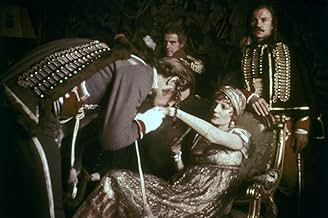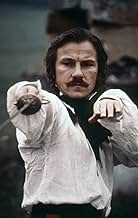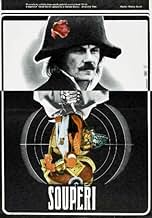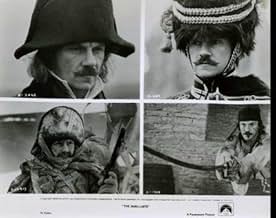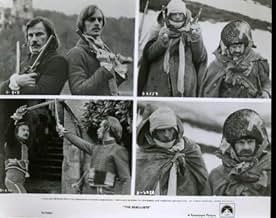IMDb-BEWERTUNG
7,4/10
27.691
IHRE BEWERTUNG
Eine kleine Fehde zweier napoleonischer Offiziere entwickelt sich zu einer jahrzehntelangen Serie von Duellen.Eine kleine Fehde zweier napoleonischer Offiziere entwickelt sich zu einer jahrzehntelangen Serie von Duellen.Eine kleine Fehde zweier napoleonischer Offiziere entwickelt sich zu einer jahrzehntelangen Serie von Duellen.
- Nominiert für 2 BAFTA Awards
- 2 Gewinne & 4 Nominierungen insgesamt
Handlung
WUSSTEST DU SCHON:
- WissenswertesRidley Scott said that after having directed anywhere from 1,500 to 2,000 television commercials, he realized no one was going to approach him about directing a film, so he'd have to take the lead. Since his funds were limited, he used a public domain source for the story, and commissioned the script for this movie on his own.
- Patzer(at around 1h 23 mins) Faraud, loading his pistol, drops a ball into the barrel and then rams it into place. When the ball drops,a metallic sound is heard, indicating that there is no powder in the barrel.
- Zitate
Armand D'Hubert: General Feraud has made occasional attempts to kill me. That does not give him the right to claim my acquaintance.
- Crazy CreditsOpening credits prologue: STRASBOURG 1800
- VerbindungenFeatured in Duelling Directors: Ridley Scott & Kevin Reynolds (2002)
- SoundtracksBist du bei mir
(uncredited)
Music by Gottfried Heinrich Stölzel
from "Notenbüchlein für Anna Magdalena Bach No. 25. BWV 508"
Written by Johann Sebastian Bach (uncredited)
Ausgewählte Rezension
I come to this after a week of heavily mulling over Nolan's Batman world and the failure of logical tools to explain beyond themselves. And here is a film about a deeply-seated illogical drive, and by one who inspired Nolan, by his own admission, and you can perhaps see that in the series of escalating encounters with a madness that trumps reason.
And the immersive world. Scott usually aims for this, and this is from a time he did it well. He takes from Kubrick the idea of natural light that, once the camera locks in, will look and move (and slightly breathe) like a Romantic painting. The era is Napoleon's, and at least the wintry march back from Russian defeat provides opportunity for some astonishing images.
Some words exhaust their meaning, when thrown without care; so it's not enough to call this existentialist. The story is that an army officer bears an inexplicable grudge that spans 20 years and half of Europe.
Everything you need to know is in the last scene, expertly executed. The idea is that something deeply not-logical gnaws and eats at man's soul and sniffs for blood. And that men, this is strictly male, have lived with this aspect of self for so long, we have developed separate not-logical tools that allow us to not only instinctively respond to the call, however reluctantly, and in spite of recognition of how insane it is, but to silently respect and defend it as its own kind of logic (in our case, the concept of honor).
In the last scene, we have two men seeking each the other to eliminate him from existence, as simple as that. It's the oldest game men have played, and the same thrill resurfaces across poker tables and football. It's got to have something of death in it, if it is to matter at all.
And I have a book called Bushido: The Soul of Japan here with me, retrieved from a shelf because the film sparked an interest, that explains how the blade is the samurai's extension of soul and imbued with the same discipline.
The two rivals have fenced for the entire film, but settle on pistols for the deciding duel, and wander about in a forest, two shots each, meaning they will be able to instantly discharge what is in their soul.
Each man in the shot he takes reveals who they are, one of them rash and impertinent, and fires first, they other level-headed and reserved. The subtle context of the scene is that politics do decide war from afar, in our case the slippery (faulty) pair of boots of the aristocratic boot-maker.
Which is, in a third level, a beautiful way of putting the subtle discord strummed by the universe that creates a slippery world and illogical selves of us, dumb chance as fate.
And suffice to say, the film is British, so you will not learn it here, but in spite of the probably British-started legend, the French are historically the best tactical warriors in Europe. There is a reason why nearly every word in the modern lexicon of war is originally French, and that includes honour.
And the immersive world. Scott usually aims for this, and this is from a time he did it well. He takes from Kubrick the idea of natural light that, once the camera locks in, will look and move (and slightly breathe) like a Romantic painting. The era is Napoleon's, and at least the wintry march back from Russian defeat provides opportunity for some astonishing images.
Some words exhaust their meaning, when thrown without care; so it's not enough to call this existentialist. The story is that an army officer bears an inexplicable grudge that spans 20 years and half of Europe.
Everything you need to know is in the last scene, expertly executed. The idea is that something deeply not-logical gnaws and eats at man's soul and sniffs for blood. And that men, this is strictly male, have lived with this aspect of self for so long, we have developed separate not-logical tools that allow us to not only instinctively respond to the call, however reluctantly, and in spite of recognition of how insane it is, but to silently respect and defend it as its own kind of logic (in our case, the concept of honor).
In the last scene, we have two men seeking each the other to eliminate him from existence, as simple as that. It's the oldest game men have played, and the same thrill resurfaces across poker tables and football. It's got to have something of death in it, if it is to matter at all.
And I have a book called Bushido: The Soul of Japan here with me, retrieved from a shelf because the film sparked an interest, that explains how the blade is the samurai's extension of soul and imbued with the same discipline.
The two rivals have fenced for the entire film, but settle on pistols for the deciding duel, and wander about in a forest, two shots each, meaning they will be able to instantly discharge what is in their soul.
Each man in the shot he takes reveals who they are, one of them rash and impertinent, and fires first, they other level-headed and reserved. The subtle context of the scene is that politics do decide war from afar, in our case the slippery (faulty) pair of boots of the aristocratic boot-maker.
Which is, in a third level, a beautiful way of putting the subtle discord strummed by the universe that creates a slippery world and illogical selves of us, dumb chance as fate.
And suffice to say, the film is British, so you will not learn it here, but in spite of the probably British-started legend, the French are historically the best tactical warriors in Europe. There is a reason why nearly every word in the modern lexicon of war is originally French, and that includes honour.
- chaos-rampant
- 29. Aug. 2012
- Permalink
Top-Auswahl
Melde dich zum Bewerten an und greife auf die Watchlist für personalisierte Empfehlungen zu.
Details
- Erscheinungsdatum
- Herkunftsländer
- Sprachen
- Auch bekannt als
- The Duellists
- Drehorte
- Château de Commarques, Dordogne, Frankreich(final pistol duel)
- Produktionsfirmen
- Weitere beteiligte Unternehmen bei IMDbPro anzeigen
Box Office
- Budget
- 900.000 $ (geschätzt)
Zu dieser Seite beitragen
Bearbeitung vorschlagen oder fehlenden Inhalt hinzufügen




